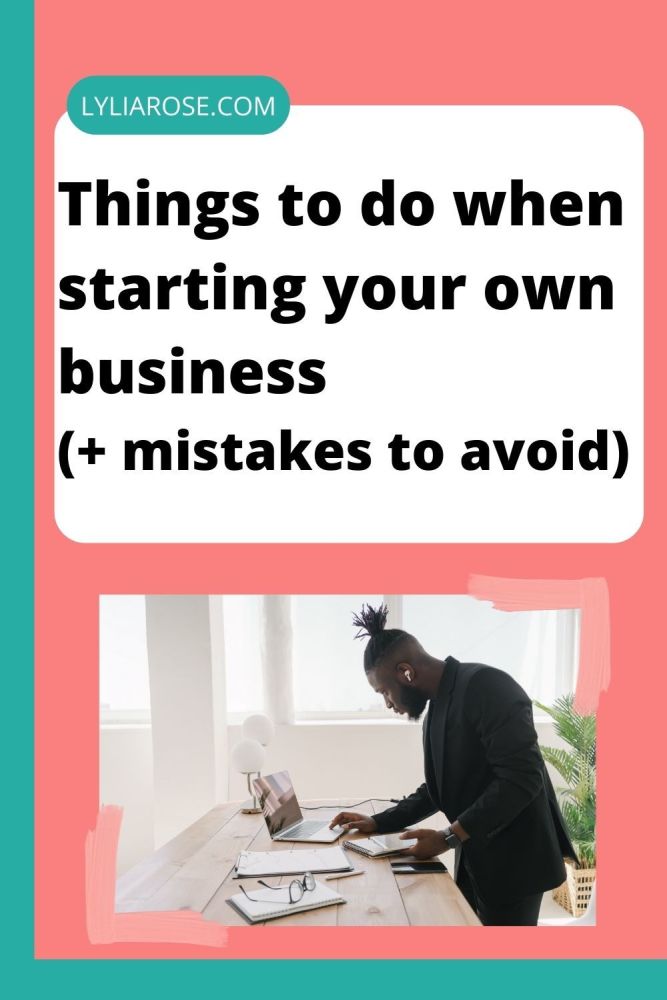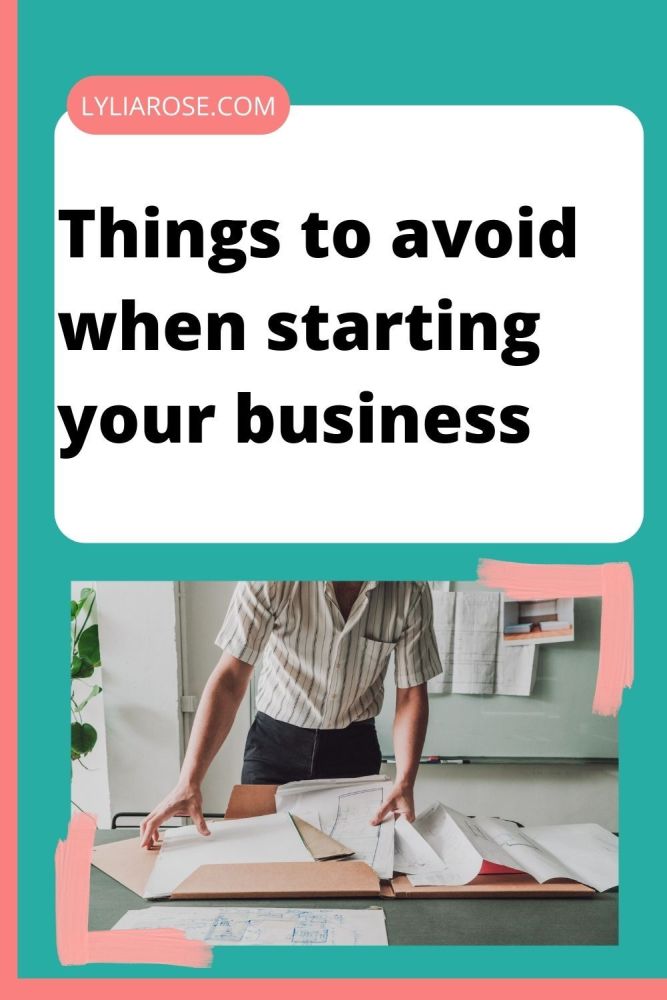7 Things To Do When Starting Your Own Business
Posted on
What are the first things to do when starting your own business? And what are the mistakes to avoid? This checklist of actionable tips will get you on your way!

Things to do when starting your own business
Deciding to start your own business is an exciting and nerve wracking moment.
Perhaps you’ve a hobby that you can turn into a money making venture, you want to start monetising your blog, or there’s a home business idea you’ve been dreaming of for years and now you’re ready to make it a reality!
There are lots of things to think about when setting up your own business for the first time. I’m no stranger to this process as both myself and my husband run our own businesses from home. The beginning process is one I am familiar with.
In no particular order here are the first seven things to think about, create or design when setting up your own business:
- Decide on the business name
- Have professional business cards printed and to hand
- Create a professional business website
- Set up social media accounts for your business
- Set up a domain email address
- Decide on branding and stick with it
- Register and fulfil your legal tax obligations
Let's explore in more detail.
1. Decide on the business name
One of the first things to do when starting a business is decide on a business name. This can either be the easiest process or the hardest!
Sometimes you know instantly what you want to call your business and if it’s not already a taken name then away you go. However, if every name you think of already exists as a business then it can become more of a challenge.
Mind map and brainstorm until you come up with a perfect name. Don’t settle for anything you are not 100% sure on. You'll also want to look online for where you can buy a domain name to ensure your business name is available as a URL, otherwise you may need to choose something else if the domain name is already taken.
Also, think about the longevity of the business name. There are many bloggers who call their blogs something like 'Baby Isla’s Mummy' only to go on to have lots more children and after a year, Isla isn’t a baby anymore.
Try to think of a name that can represent your business as it evolves into the future. Once you have the name sorted then you can design the perfect logo. You’ll also want to check your proposed business name is available as a domain and on the social media accounts you plan to use.
2. Have professional business cards printed and to hand
No doubt you’ll want to tell lots of people all about your new business venture and if interested they’ll want to know your new business name and website details.
Most people will forget what they’re told, so it’s handy to have some business cards in your wallet ready to give to those inquisitive people. Then there’s no danger of them forgetting and you could instantly have a new fan, supporter or even customer.
Professional business cards are easy to make using an online printing company like HelloPrint UK where you can upload your own designs and logos.
Give some extra cards to your friends and family to pass on and news of your new venture will soon spread.
3. Create a professional business website
In the modern age it’s so important to have an online presence. Your customers will be searching online to find a company just like yours and if you’re not there, you can’t be found.
It’s a great place to showcase a portfolio, take bookings or even to sell products depending on your business model.
Setting up a website is easy than ever nowadays with plenty of free templates available even for those of us who have no idea about coding whatsoever. For a monthly or annual fee you’ll be able to get a slightly better website with more functionality and customer service to guide you through the process. Related read: How to create your own website
Create a professional business website that showcases your products and services in the best possible way. Make sure that the website is user-friendly, responsive, and optimised for search engines. If you're not familiar with web design, you may want to consider hiring a professional web designer or agency to help you.
4. Set up social media accounts for your business
As well as being found via your website, customers will want to see you have a social presence too on some or all of the social media websites available today.
If all of them is too overwhelming (and time consuming) then just pick around three that you can focus your time and energy on.
I use Twitter, Pinterest and Instagram.
All three have very different purposes, but they mean my customers and followers can see what I’m up to and contact me via these channels if preferred.
It can give your business a more personal feel and some insight into the person who runs the business and a peek behind the scenes.
5. Set up a domain email address
When you have your website set up you’ll want to set up a business email that’s linked to your domain.
This means your email address will be something like [email protected].
If you only have one domain you can set up a free email account with Zoho who will talk you through setting up a custom domain email address.
I use them for both my Create (Save 10% with discount code RAF315226 at Create website builder) and Wordpress websites (click the link for a $25 WordPress credit) and the process was pretty straightforward. If you get stuck they have an online chat team who can assist.
Of course you could go for something like [email protected] but I don’t think it looks as professional as your own domain email. Seeing as you can set this up at no extra cost, it’s definitely worth doing.
6. Decide on branding and stick with it
Once you’ve got a name and logo then you’ll want to think about your branding.
This may start with the logo and the choice of colours you use. Think of the colours you want to use for your brand and use them throughout your website, marketing materials, graphics, social media and email signatures.
Consistent branding will enable your business to be recognised and appear more professional.
This is the same with the fonts you decide to use. Have a main text font and then choose an accent font.
Your brand voice is your businesses personality and this should also be consistent allowing consumers to trust you, recognise you and rely on you.
7. Register and fulfil your legal tax obligations
The scariest sounding thing of all, but believe me it’s not that bad. If you're in the UK, you may need to register with HMRC as self-employed if you are starting a money making business.
HMRC say you're self employed if you
- run your business for yourself and take responsibility for its success or failure
- have several customers at the same time
- can decide how, where and when you do your work
- can hire other people at your own expense to help you or to do the work for you
- provide the main items of equipment to do your work
- are responsible for finishing any unsatisfactory work in your own time
- charge an agreed fixed price for your work
- sell goods or services to make a profit
They also note that "many of these also apply if you own a limited company but you’re not classed as self-employed by HMRC. Instead you’re both an owner and employee of your company."
There is a trading allowance of £1000. So you don't need to register if your gross income will be £1000 or less. As soon as it is more then you need to register with HMRC. You can find out more about the trading allowance at https://www.gov.uk/guidance/tax-free-allowances-on-property-and-trading-income#trade
If you already have an employed job, you still need to register.
You will need to declare all your business incomings and expenditure for tax purposes, even if you don’t meet the personal threshold and have nothing to pay. It still needs to be declared.
There are so many helpful guides on the HMRC website that explain everything and this is a great starting point: https://www.gov.uk/working-for-yourself
Things to avoid when starting your business
Starting a business is not an easy task. And there are many challenges of a home-based business. There are many things to consider and it can be very overwhelming. But there are also many things you should avoid when starting your business if you want to make sure that your business will not fail.
Don't start your business with the mindset that it's going to be successful right away. This is a huge risk and it will most likely fail. Also, don't start a business just because you think it's trendy or popular at the moment - this won't work in the long run either.
Here are some things to avoid when starting your business:
Not insuring yourself
Many people think that if they are running a small business, especially running it from home, then they do not need to protect themselves with insurance. However, it really is a good idea to take out a home based business insurance policy because things can and do wrong and the last thing you want is to have to pay for legal fees and compensation out of your own pocket if you are unlucky enough to have something go wrong for you.
Not putting in enough hours
A big mistake many wannabe entrepreneurs make is not treating their new business as seriously as they would any other job. If you want your new company to be successful, then you really do need to put in the hours and do whatever needs to be done. Yes, you might be able to work hours that are friendlier to your family, but you do need to work - you cannot afford to keep slacking off if you want to grow your small business.
Not spending any money
Yes, there are lots of small companies that you can start on a shoestring, but if you want your business to gain traction and start bringing in lots of money for you, then you will need to invest some money on things like paid ads, website hosting, a professional logo designer, a website developer, a business domain, etc. Yes, watch the pennies, especially in the beginning, but you need to learn when it makes sense to speculate to accumulate and when it doesn’t. If you just don’t spend anything at all, your business is unlikely to ever get off the ground in a major way.
Not focusing on your audience
When you are just starting out, you really do need to focus very clearly on your target audience. So many new business owners focus on what the business will do for them and how it will change their life without thinking about how they can provide a good experience to their customers. Think about what your customers want and need. Yes, this business is for you, but it is also for them.
Final word on the first things to do when starting a business
There are a lot of things to consider when starting your own business. From the business name, to registering, creating websites and social media accounts and the rest, it can be an overwhelming experience. Luckily there are lots of guides online to assist you with the process so you can be up and running in no time! Then you'll want to focus your efforts on a marketing strategy for your business and letting everyone know all about it!
To roundup, here are seven of the first things to do when starting a business:
- Decide on the business name
- Have professional business cards printed and to hand
- Create a professional business website
- Set up social media accounts for your business
- Set up a domain email address
- Decide on branding and stick with it
- Register and fulfil your legal tax obligations
And things to avoid when starting a business:
- Not insuring yourself
- Not putting in enough hours
- Not spending any money
- Not focusing on your audience
If you can avoid making these really common business mistakes, then your home business stands a much better chance of being successful now and in the future.
Best of luck with your new business venture!
Want to make some extra cash?
Find loads of ways to make extra money at home on my blog, as well as my favourite side hustle in my matched betting blog.
To get started, you can make money online with 60 methods I’ve tried and tested.
Just need £1000? Here’s how to make £1000 in one month at home.
Short on time? These methods can make money in one hour.
Want free cash? Here are loads of free money offers.
Subscribe to our newsletter for the best free money offers, money-making and money-saving tips we discover!
Starting your own business is so exciting. Good luck!


